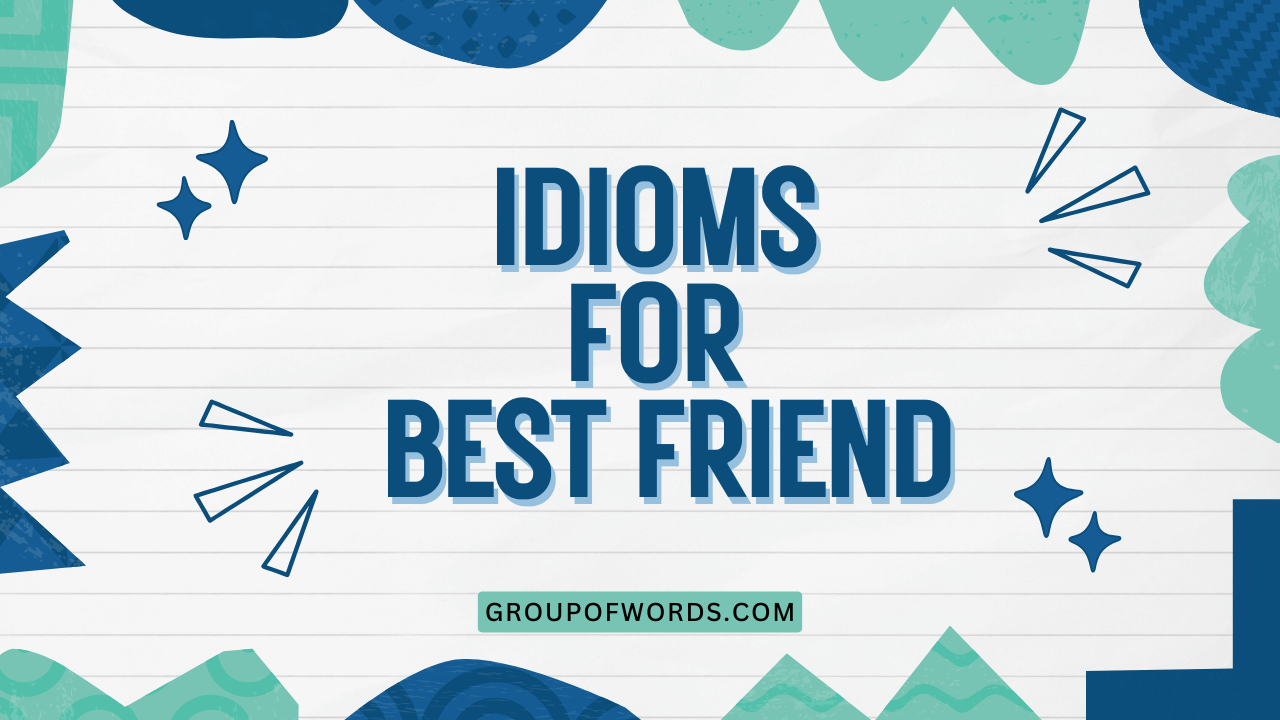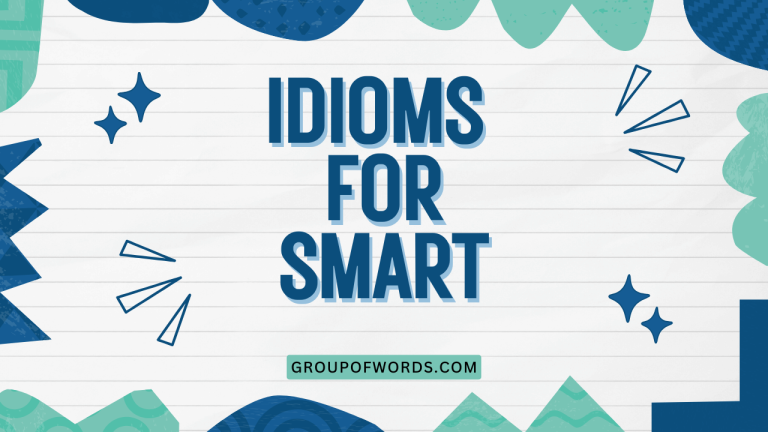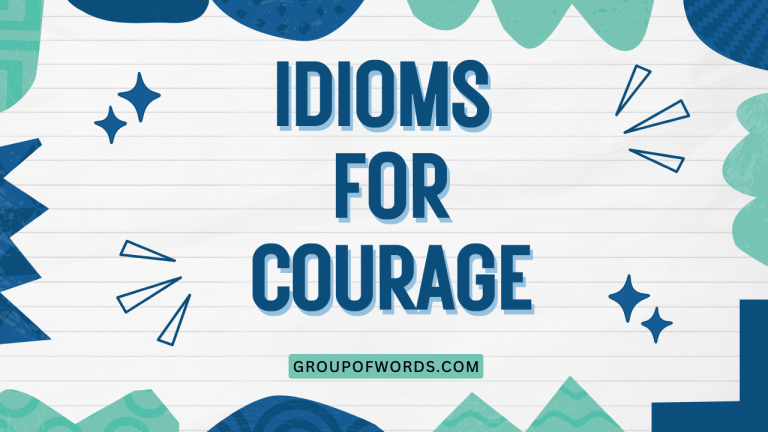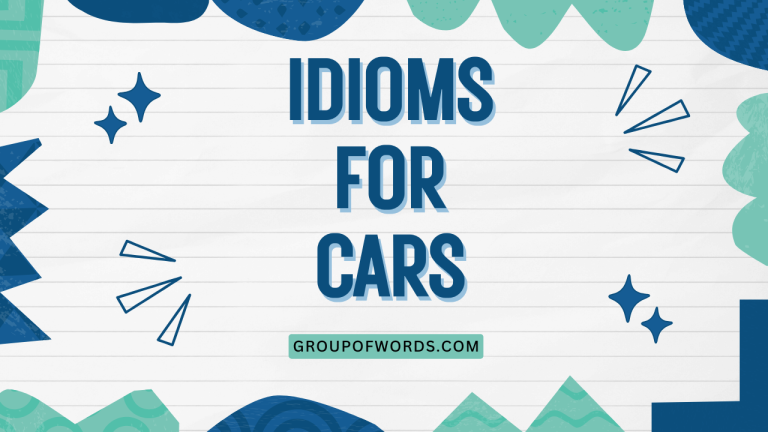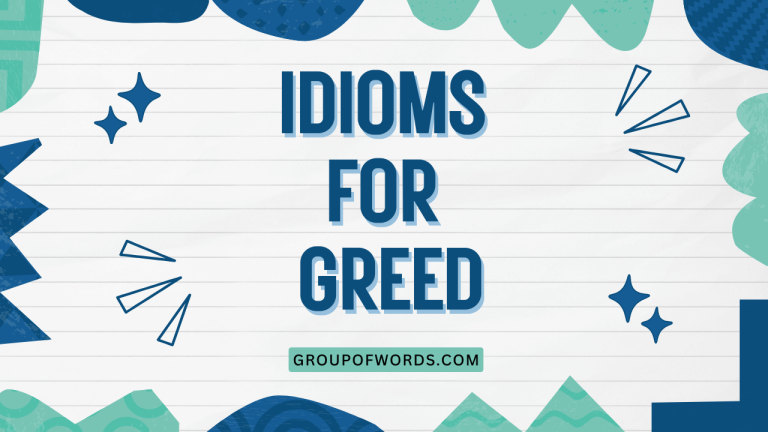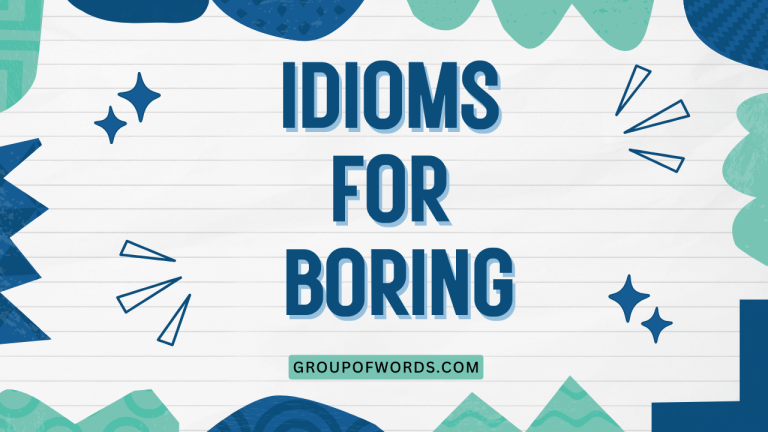Idioms for Best Friend: A Comprehensive Guide
Understanding idioms is crucial for mastering the nuances of the English language. Idioms add color and depth to conversations, making communication more engaging and relatable.
Specifically, idioms used to describe a “best friend” can enrich your vocabulary and help you express affection and appreciation more vividly. This guide is designed for English language learners, teachers, and anyone looking to enhance their understanding and use of idiomatic expressions.
By exploring these idioms, you’ll gain a better grasp of both language and culture, allowing you to communicate more effectively and connect with others on a deeper level.
This article provides a detailed exploration of idioms related to best friends, offering definitions, examples, and practical exercises to improve your fluency and comprehension. Whether you’re a beginner or an advanced learner, this guide will equip you with the knowledge and skills to confidently use these expressions in your daily conversations.
Table of Contents
- Introduction
- Definition of Idioms for Best Friend
- Structural Breakdown of Idioms
- Types and Categories of Best Friend Idioms
- Examples of Best Friend Idioms
- Usage Rules for Best Friend Idioms
- Common Mistakes When Using Best Friend Idioms
- Practice Exercises
- Advanced Topics: Cultural Nuances
- Frequently Asked Questions
- Conclusion
Definition of Idioms for Best Friend
An idiom is a phrase or expression whose meaning cannot be understood from the literal meanings of its individual words. Instead, idioms have a figurative meaning that is culturally specific.
Idioms related to “best friends” are phrases that describe the special bond, loyalty, and shared experiences that characterize such relationships. These idioms often use metaphors, similes, or other figures of speech to convey the depth and significance of the friendship.
Classification: Idioms can be classified based on their structure (e.g., phrasal verbs, proverbs, clichés) or their meaning (e.g., idioms of support, idioms of closeness). Best friend idioms fall under the broader category of expressions related to relationships and emotions.
Function: The primary function of these idioms is to express affection, appreciation, and understanding within the context of a close friendship. They allow speakers to convey complex emotions and shared experiences in a concise and evocative way.
Contexts: Best friend idioms are commonly used in informal settings, such as conversations with friends and family, personal writing, and social media. They can also appear in more formal contexts, such as literature, movies, and speeches, to add emotional depth and relatability.
Structural Breakdown of Idioms
Idioms related to best friends, like all idioms, defy literal interpretation. Understanding their structure involves recognizing that the meaning of the entire phrase is different from the sum of its parts.
Here’s a breakdown:
- Figurative Language: Many idioms employ figurative language, such as metaphors (e.g., “partners in crime”) and similes (e.g., “thick as thieves”). These figures of speech create a non-literal comparison or association.
- Fixed Expressions: Idioms are typically fixed expressions, meaning that the words and their order cannot be changed without altering or destroying the meaning. For example, “a shoulder to cry on” cannot be easily changed to “a back to cry on” without losing its idiomatic sense.
- Cultural Context: The meaning of an idiom is often deeply rooted in cultural context. Understanding the cultural background can provide valuable insights into the idiom’s origin and intended meaning.
- Grammatical Structure: While idioms themselves are fixed, they can be incorporated into different grammatical structures within a sentence. For example, “We’ve been through thick and thin” uses the idiom as a prepositional phrase.
Understanding these structural elements will help you recognize and interpret idioms more effectively, enhancing your overall language comprehension.
Types and Categories of Best Friend Idioms
Idioms for best friends can be categorized based on the specific aspect of the friendship they emphasize. Here are some common categories:
Idioms of Support and Loyalty
These idioms highlight the unwavering support and loyalty that best friends offer each other. They often describe the willingness to stand by a friend through difficult times.
Idioms of Closeness and Intimacy
These idioms emphasize the deep connection and intimacy that characterize best friend relationships. They often describe a shared understanding and emotional bond.
Idioms of Shared History
These idioms focus on the long-standing history and shared experiences that have shaped the friendship. They often describe memories, inside jokes, and significant events that have strengthened the bond.
Humorous and Affectionate Idioms
These idioms use humor and affection to describe the unique quirks and playful interactions that define the friendship. They often involve lighthearted teasing and inside jokes.
Examples of Best Friend Idioms
The following sections provide extensive examples of idioms related to best friends, organized by category. Each example is accompanied by a definition and a sentence demonstrating its usage.
Examples of Support and Loyalty Idioms
This table provides examples of idioms related to support and loyalty in best friend relationships. These idioms illustrate the unwavering commitment friends have to one another, especially during challenging times.
| Idiom | Definition | Example Sentence |
|---|---|---|
| A shoulder to cry on | Someone who offers comfort and support during times of distress. | Whenever I’m feeling down, Sarah is always a shoulder to cry on. |
| Stand by someone | To support or defend someone, especially when they are facing difficulties. | No matter what happens, I will always stand by my best friend. |
| Have someone’s back | To support or protect someone. | You can always count on me; I’ll always have your back. |
| Ride or die | Extremely loyal and willing to do anything for someone. | We’ve been friends since kindergarten; she’s my ride or die. |
| Through thick and thin | Through good times and bad times. | We’ve been through thick and thin together, and our friendship has only grown stronger. |
| In someone’s corner | To support someone. | I’m always in your corner, cheering you on. |
| A true blue friend | A loyal and trustworthy friend. | He’s a true blue friend; you can always rely on him. |
| Be there for someone | To be available and supportive when someone needs you. | I’ll always be there for you, no matter what. |
| Lean on someone | To rely on someone for support. | You can lean on me whenever you need help. |
| A friend in need is a friend indeed | A true friend is someone who helps you when you are in trouble. | When I lost my job, she was the first to offer help; a friend in need is a friend indeed. |
| Pick up the pieces | To help someone recover from a difficult situation. | After the breakup, her best friend helped her pick up the pieces. |
| Stick up for someone | To defend someone who is being criticized or attacked. | He always sticks up for his friends, no matter what. |
| Go to bat for someone | To support or defend someone. | I’ll go to bat for you if anyone tries to undermine your work. |
| Stand by your side | To support someone especially in difficult times. | I will always stand by your side through everything. |
| Be a rock | To be a source of stability and support. | During the crisis, she was a rock for her family and friends. |
| Always have your back | To support and defend someone. | Don’t worry, I will always have your back. |
| Carry the torch for someone | To continue supporting or advocating for someone or something. | Even after he moved away, she continued to carry the torch for their friendship. |
| Defend to the death | To defend someone with unwavering loyalty. | He would defend his best friend to the death. |
| Be a port in a storm | To be a safe and supportive place in difficult times. | She was a port in a storm for me when I was going through a divorce. |
| Be a tower of strength | To provide strong support and encouragement. | He was a tower of strength when his friend lost a loved one. |
| Be a solid friend | To be a reliable and trustworthy friend. | He’s a solid friend, you can always count on him. |
| Through hell or high water | Through any difficulty or hardship. | They promised to stick together through hell or high water. |
| In the trenches together | Experiencing the same difficult situation together. | We’ve been in the trenches together at work, so we’re really close friends. |
| Go the extra mile | To make more effort than is expected. | She always goes the extra mile for her friends. |
Examples of Closeness and Intimacy Idioms
This table provides examples of idioms that describe closeness and intimacy in best friend relationships. These idioms highlight the deep connection and shared understanding between close friends.
| Idiom | Definition | Example Sentence |
|---|---|---|
| Like two peas in a pod | Very similar and always together. | They’re like two peas in a pod; they do everything together. |
| Thick as thieves | Very close and secretive. | Those two are thick as thieves; I wouldn’t be surprised if they were planning something. |
| Attached at the hip | Always together, very close. | Ever since they met, they’ve been attached at the hip. |
| Soulmate | Someone with whom you have a deep and natural affinity. | I consider her my soulmate; we understand each other perfectly. |
| Kindred spirits | People who have similar interests and feelings. | We’re kindred spirits; we both love hiking and reading. |
| Bosom buddies | Very close friends. | They’ve been bosom buddies since childhood. |
| Inseparable | Unable to be separated. | They are inseparable; you never see one without the other. |
| Close-knit | Having strong relationships with each other. | They have a close-knit group of friends who support each other. |
| Two of a kind | Very similar in personality or behavior. | They’re two of a kind; both are always up for an adventure. |
| Finish each other’s sentences | To know someone so well that you can anticipate what they are going to say. | They’re so close they can finish each other’s sentences. |
| Know someone inside and out | To know someone very well. | After all these years, I know my best friend inside and out. |
| Share a brain | To think alike or have the same ideas. | Sometimes I think we share a brain; we always agree on everything. |
| Have a connection | To have a strong bond or understanding with someone. | We have a connection that I’ve never felt with anyone else. |
| Get each other | To understand each other. | We just get each other; it’s hard to explain. |
| See eye to eye | To agree with each other. | We always see eye to eye on important issues. |
| Have a lot in common | To share similar interests or experiences. | We have a lot in common, which is why we get along so well. |
| Click with someone | To immediately feel a connection with someone. | We clicked the moment we met. |
| Cut from the same cloth | To be very similar in character or behavior. | They’re cut from the same cloth, both adventurous and free-spirited. |
| Partners in crime | Friends who often do mischievous things together. | They were always partners in crime during their school days. |
| Two halves of a whole | Two people who complement each other perfectly. | They’re like two halves of a whole; they complete each other. |
| A match made in heaven | A perfect pairing or relationship. | Their friendship is a match made in heaven; they’re so compatible. |
| Connected at the hip | Inseparably close; always together. | Those two are connected at the hip, always hanging out together. |
| Have an unspoken understanding | To understand each other without needing to say anything. | They have an unspoken understanding that comes from years of friendship. |
| Share the same wavelength | To have similar thoughts and feelings. | We share the same wavelength, so we always know what the other is thinking. |
Examples of Shared History Idioms
This table provides examples of idioms that describe shared history in best friend relationships. These idioms emphasize the significance of long-standing friendships and the memories created over time.
| Idiom | Definition | Example Sentence |
|---|---|---|
| Been through the mill | Experienced many difficulties and challenges together. | They’ve been through the mill together, and it’s made their friendship stronger. |
| Old friends | Friends who have known each other for a long time. | We’re old friends; we’ve known each other since we were kids. |
| Water under the bridge | Past events that are no longer important. | All those arguments are water under the bridge now; we’ve moved on. |
| Down memory lane | Recalling past events and experiences. | We took a trip down memory lane, looking at old photos and reminiscing. |
| Those were the days | Referring to a past time that was enjoyable. | Those were the days when we used to spend all summer at the beach. |
| Come a long way | Made significant progress or changes over time. | We’ve come a long way since we first met in college. |
| Seen better days | Experienced a more prosperous or successful time in the past. | Our old hangout spot has seen better days, but we still love going there. |
| A blast from the past | Something that reminds you of the past. | Running into my old friend was a blast from the past. |
| Back in the day | Referring to a time in the past. | Back in the day, we used to play video games all night. |
| Know each other from way back | To have known each other for a very long time. | We know each other from way back; we grew up together. |
| Shared history | A common background and experiences. | Our shared history is what makes our friendship so special. |
| Remember when | A phrase used to start reminiscing about past events. | Remember when we got lost in the woods? |
| Years of friendship | A long-standing friendship. | After years of friendship, we’re more like family. |
| Grew up together | To have spent one’s childhood and adolescence together. | We grew up together and shared so many memories. |
| Walked the same path | To have had similar experiences and challenges. | We’ve walked the same path, so we understand each other’s struggles. |
| Through the years | Over a long period of time. | Through the years, our friendship has remained strong. |
| Stood the test of time | Remained strong and enduring over a long period. | Our friendship has stood the test of time. |
| Been there since day one | To have been present from the very beginning. | He’s been there since day one, supporting me through everything. |
| Those were different times | Referring to a past time that was different from the present. | Those were different times; things were simpler back then. |
| A trip down memory lane | A nostalgic recollection of past events. | Looking at old photos was a trip down memory lane. |
| From way back when | From a long time ago. | We’ve been friends from way back when. |
| Lingering memories | Memories that stay with you for a long time. | We have many lingering memories from our childhood. |
| A lifetime of memories | A vast collection of memories accumulated over a long time. | We share a lifetime of memories. |
| A long-standing friendship | A friendship that has lasted for many years. | They have a long-standing friendship. |
Examples of Humorous and Affectionate Idioms
This table provides examples of idioms that use humor and affection to describe best friend relationships. These idioms highlight the playful and lighthearted aspects of close friendships.
| Idiom | Definition | Example Sentence |
|---|---|---|
| Partners in crime | Friends who often do mischievous things together. | They were always partners in crime during their school days. |
| A bad influence | Someone who encourages you to do things that are not good. | He’s a bad influence, but I love him anyway. |
| Like a brother/sister from another mother | Someone who is as close as a sibling, even though they are not related. | She’s like a sister from another mother; we’re that close. |
| Two peas in a pod | Very similar and always together. | They’re two peas in a pod; they do everything together. |
| Attached at the hip | Always together, very close. | Ever since they met, they’ve been attached at the hip. |
| A match made in heaven | A perfect pairing or relationship. | Their friendship is a match made in heaven; they’re so compatible. |
| A crazy duo | A pair of friends who are known for their eccentric behavior. | They are a crazy duo; always up to some kind of mischief! |
| In cahoots | Working together secretly, often for a dishonest purpose. | Those two are probably in cahoots; they’re always whispering to each other. |
| Cut from the same cloth | To be very similar in character or behavior. | They’re cut from the same cloth, both adventurous and free-spirited. |
| A dynamic duo | Two people who work well together and achieve great things. | They make a dynamic duo; they can tackle any challenge. |
| A ray of sunshine | Someone who brings happiness and positivity to others. | She’s a ray of sunshine; she always knows how to cheer me up. |
| A constant source of amusement | Someone who is always entertaining and funny. | He’s a constant source of amusement; he always makes me laugh. |
| A lovable goofball | Someone who is silly and endearing. | He’s a lovable goofball; you can’t help but like him. |
| A quirky companion | Someone who is unique and interesting. | She’s a quirky companion; she always has something interesting to say. |
| A hilarious sidekick | Someone who is funny and supports their friend. | He’s a hilarious sidekick; he always knows how to make me laugh. |
| Double trouble | Two people who are likely to cause mischief or problems. | When those two get together, it’s always double trouble. |
| A mischievous pair | Two people who are known for their playful and naughty behavior. | They are a mischievous pair; always up to something. |
| A comical twosome | Two people who are funny and entertaining when they are together. | They are a comical twosome; they always have everyone in stitches. |
| A fun-loving duo | Two people who enjoy having fun together. | They’re a fun-loving duo; always looking for the next adventure. |
| Like two kids | Acting playful and carefree. | When they’re together, they act like two kids. |
| Stir up trouble | To cause problems or excitement. | Those two always stir up trouble when they get together. |
| A match made in madness | A pairing that is chaotic and unpredictable, but enjoyable. | Their friendship is a match made in madness. |
| A source of laughter | Someone who brings joy and amusement. | He’s a constant source of laughter. |
| A partner in shenanigans | Someone who joins in on playful or mischievous activities. | She’s my partner in shenanigans. |
Usage Rules for Best Friend Idioms
Using idioms correctly requires attention to context and nuance. Here are some key usage rules to keep in mind:
- Context Matters: Always consider the context in which you are using an idiom. The meaning of an idiom can change depending on the situation.
- Audience Awareness: Be mindful of your audience. Idioms are generally more appropriate in informal settings. Avoid using them in formal writing or presentations unless you are confident that your audience will understand them.
- Word Order: Idioms are fixed expressions, so the word order cannot be changed. Using the wrong word order can alter or destroy the meaning of the idiom.
- Tense and Agreement: While the idiom itself is fixed, you can change the tense or verb agreement to fit the context of your sentence. For example, “I’ll always have your back” can be changed to “He always had my back.”
- Overuse: Avoid overusing idioms. While they can add color to your language, using too many idioms can make your speech sound unnatural or forced.
By following these usage rules, you can use idioms effectively and appropriately, enhancing your communication skills and building stronger relationships.
Common Mistakes When Using Best Friend Idioms
Learners often make mistakes when using idioms due to their non-literal nature. Here are some common errors to avoid:
- Literal Interpretation: Interpreting an idiom literally instead of understanding its figurative meaning.
- Incorrect: “They are like two peas, so they must be green and round.”
- Correct: “They are like two peas in a pod; they are very similar and always together.”
- Incorrect Word Order: Changing the word order of an idiom, which can alter or destroy its meaning.
- Incorrect: “A cry shoulder to on.”
- Correct: “A shoulder to cry on.”
- Misunderstanding the Context: Using an idiom in an inappropriate context.
- Incorrect: Using “partners in crime” to describe friends who are working on a serious project.
- Correct: Using “partners in crime” to describe friends who are playfully mischievous.
- Overusing Idioms: Using too many idioms in a single conversation, which can sound unnatural.
- Incorrect: “We’ve been through thick and thin, and we’re thick as thieves. We’re like two peas in a pod, partners in crime!”
- Correct: “We’ve been through thick and thin, and we’re incredibly close.”
Being aware of these common mistakes will help you avoid errors and use idioms more confidently and accurately.
Practice Exercises
Test your understanding of best friend idioms with the following exercises.
Exercise 1: Fill in the Blanks
Fill in the blanks with the correct idiom from the list below.
Idiom List: a shoulder to cry on, through thick and thin, have your back, like two peas in a pod, partners in crime, a true blue friend
| Question | Answer |
|---|---|
| 1. She’s always there for me when I’m upset; she’s truly __________. | a shoulder to cry on |
| 2. We’ve been __________ together, and our friendship has only grown stronger. | through thick and thin |
| 3. Don’t worry, I’ll always __________. | have your back |
| 4. They’re __________, always together and doing the same things. | like two peas in a pod |
| 5. They were __________, always getting into trouble together. | partners in crime |
| 6. He’s __________, you can always rely on him. | a true blue friend |
| 7. They act like ________, always causing trouble wherever they go. | partners in crime |
| 8. She has been ________ for me since we were kids. | a shoulder to cry on |
| 9. I will always _______ no matter what decision you make. | have your back |
| 10. Since they met, they have been ______. | like two peas in a pod |
Exercise 2: Matching
Match the idiom with its correct definition.
| Idiom | Definition |
|---|---|
| 1. Thick as thieves | a. Experiencing difficulties together |
| 2. A friend in need | b. Very close and secretive |
| 3. In someone’s corner | c. A true friend helps in trouble |
| 4. Been through the mill | d. To support someone |
| 5. Ride or die | e. Extremely loyal |
Answers:
| Question | Answer |
|---|---|
| 1. Thick as thieves | b. Very close and secretive |
| 2. A friend in need | c. A true friend helps in trouble |
| 3. In someone’s corner | d. To support someone |
| 4. Been through the mill | a. Experiencing difficulties together |
| 5. Ride or die | e. Extremely loyal |
Exercise 3: Sentence Completion
Complete the following sentences using the most appropriate idiom.
| Question | Answer | |
|---|---|---|
| 1. They’ve __________ since they were kids, sharing all their secrets and dreams. (know each other from way back / just met) | know each other from way back | |
| 2. During the crisis, she was __________ for her family and friends, providing unwavering support. (a tower of strength / a fair-weather friend) | a tower of strength | |
| 3. They always __________ on important issues, making their partnership very effective. (see eye to eye / disagree) | see eye to eye | |
| 4. Those two are always __________, causing mischief wherever they go. (stirring up trouble / being angels) | stirring up trouble | |
| 5. She’s __________, always bringing happiness and positivity to those around her. (a ray of sunshine / a dark cloud) | a ray of sunshine | |
| 6. I know that I can always __________ my best friend when I am facing a difficult situation. (lean on / ignore) | lean on | |
| 7. My best friend and I have been __________ since we were in elementary school; we have so many memories together! (old friends / mere acquaintances) | old friends | |
| 8. She and I __________ the moment we started talking about our favorite books. (clicked with / disliked) | clicked with | |
| 9. My siblings and I have been __________ because we have experienced both good and bad times together. (through thick and thin / fair-weather friends) | through thick and thin | |
| 10. I know I can always __________ my best friend, because she is always kind and supportive. (count on / distrust) | count on |
Advanced Topics: Cultural Nuances
Idioms are often deeply rooted in culture, and their meanings can vary across different regions and languages. Understanding these cultural nuances is essential for using idioms appropriately and avoiding misunderstandings.
- Regional Variations: Some idioms are specific to certain regions or dialects. For example, an idiom commonly used in the United States may not be understood in the United Kingdom, and vice versa.
- Historical Context: The origins of many idioms are tied to historical events or cultural practices. Understanding the historical context can provide valuable insights into the idiom’s meaning and usage.
- Translation Challenges: Idioms are notoriously difficult to translate directly from one language to another. A literal translation may not make sense or may convey a completely different meaning.
- Cultural Sensitivity: Some idioms may be considered offensive or inappropriate in certain cultures. It’s important to be aware of these sensitivities and avoid using idioms that could cause offense.
By exploring these advanced topics, you can develop a deeper understanding of the cultural dimensions of idioms and use them more effectively in cross-cultural communication.
Frequently Asked Questions
What is the difference between an idiom and a proverb?
An idiom is a phrase whose meaning is not predictable from the usual meanings of its constituent elements, while a proverb is a short, well-known saying that expresses a general truth or piece of advice.
How can I improve my understanding of idioms?
Read widely, listen to native speakers, and pay attention to the context in which idioms are used. Practice using idioms in your own speech and writing, and don’t be afraid to ask for feedback.
Are idioms important for learning English?
Yes, idioms are an essential part of the English language. Understanding and using idioms will help you communicate more effectively and connect with native speakers on a deeper level.
Can I use idioms in formal writing?
In general, idioms are more appropriate for informal settings. However, they can be used in formal writing if they are used sparingly and are appropriate for the context and audience.
Where can I find more examples of best friend idioms?
You can find more examples of best friend idioms in books, movies, TV shows, and online resources. Pay attention to how native speakers use idioms in their daily conversations.
Conclusion
Idioms are a fascinating and essential aspect of the English language, adding color, depth, and nuance to our communication. By understanding and using idioms related to best friends, you can express affection, appreciation, and understanding in a more vivid and relatable way.
This guide has provided a comprehensive overview of best friend idioms, including their definitions, structural breakdown, types, usage rules, and common mistakes to avoid.
As you continue your language learning journey, remember to practice using these idioms in your daily conversations and writing. Pay attention to the context and audience, and don’t be afraid to experiment with different expressions.
With time and practice, you’ll become more confident and fluent in your use of idioms, enhancing your communication skills and building stronger relationships.
